AT&T laps up Leap Wireless, gifting 4G LTE and gaining pre-paid customers
No-contract carrier finally has a contract for a merger

AT&T announced that it's buying pre-paid carrier Leap Wireless and taking over the provider's better-known Cricket Wireless brand for about $1.2 billion.
This cash deal amounts to $15 per share, a premium that sent Leap's stock soaring more than 116 percent in after hours trading.
"AT&T will acquire all of Leap's stock and wireless properties," said the carrier in a late Friday press release. "[This includes] licenses, network assets, retail stores and approximately 5 million subscribers."
AT&T also noted that Leap has $2.8 billion of net debt. As we have reported in the past, it has an abundance of high-end pre-paid handsets like the iPhone 5 it can't get rid of fast enough.
AT&T touts more competition
The good news for Leap Wireless' 96 million customers in 35 U.S. states is that they will be able to access AT&T's superior 4G LTE network.
AT&T, meanwhile, finally gets a better foothold in the pre-paid market in addition to just having relaunched its no-contract GoPhone plans.
The nation's No. 2 carrier behind Verizon has been looking for a partner to merge with for a number of years now, but was blocked from acquiring T-Mobile.
Sign up for breaking news, reviews, opinion, top tech deals, and more.
This new acquisition doesn't mean Cricket Wireless and its 3,400 employees are going away, however.
"AT&T will retain the Cricket brand name, provide Cricket customers with access to AT&T's award-winning 4G LTE mobile network, utilize Cricket's distribution channels, and expand Cricket's presence to additional U.S. cities."
One hurdle down, government to go
A significant amount of Leap Wireless shareholders seem to be on board, according to AT&T.
"Owners of approximately 29.8 percent of Leap's outstanding shares have entered into an agreement to vote in favor of the transaction."
The deal is still subject to review by the Federal Communications Commission and Department of Justice, and is expected to close in the next six to nine months.
